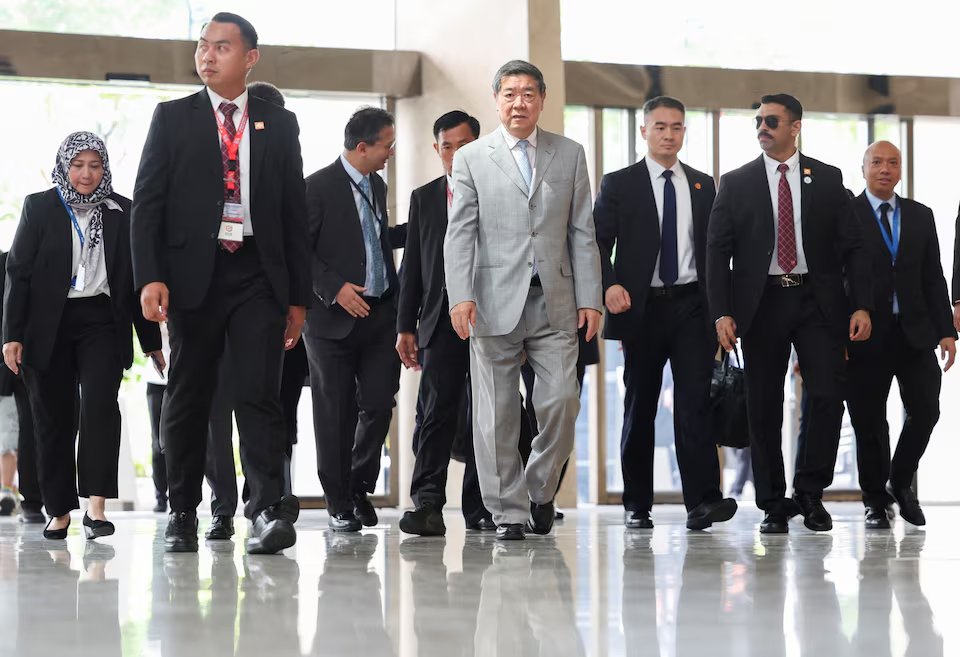News
U.S. and China Seek to Contain Trade War, Salvage Trump–Xi Meeting in Malaysia

Top U.S. and Chinese economic officials began talks in Kuala Lumpur on Saturday, aiming to prevent their trade war from escalating and to ensure next week’s meeting between U.S. President Donald Trump and Chinese President Xi Jinping goes ahead as planned.
The discussions, held on the sidelines of the ASEAN Summit, come amid renewed tensions following Trump’s threat to impose sweeping new 100% tariffs and other trade restrictions on Chinese goods starting November 1. The move was in response to Beijing’s tighter export controls on rare earth magnets and minerals.
Recent U.S. actions — including the expansion of its export blacklist to cover thousands more Chinese firms — have jeopardized a fragile truce forged over four previous meetings between U.S. Treasury Secretary Scott Basent, Trade Representative Jamieson Greer, and Chinese Vice Premier He Lifeng since May.
China’s top trade negotiator, Li Chenggang, also joined the talks. According to a Reuters witness, Li arrived with He at Kuala Lumpur’s Merdeka 118 Tower — the world’s second-tallest building and the venue for the closed-door meeting.
Both governments have shared little about the agenda, and there are no plans for public statements or press briefings.
Paving the Way for Trump–Xi
The three senior officials are working to pave the way for Trump and Xi to meet next Thursday at the APEC Summit in South Korea. The high-stakes discussion could focus on tariffs, technology controls, and limited relief for U.S. soybean exports to China.
Moments before the talks began, Trump departed Washington for his five-day tour of Malaysia, Japan, and South Korea — his longest overseas trip since taking office in January.
Speaking to reporters aboard Air Force One, Trump confirmed he would raise several contentious issues with Xi, including China’s suspension of U.S. soybean purchases and the status of democratic Taiwan, which Beijing claims as its own. Trump emphasized he has no plans to visit Taiwan.
He also said he would bring up the case of imprisoned Hong Kong media tycoon Jimmy Lai, whose detention has become one of the most high-profile examples of China’s crackdown on freedoms in the Asian financial hub.
“We have a lot to discuss with President Xi — and he has a lot to discuss with us,” Trump said. “I think our meeting will go well.”
Trump added that he hopes China can help Washington manage its dealings with Russia, calling the situation “a delicate balance.”
A Fragile Balance
Josh Lipsky, chair of international economics at the Atlantic Council, said Basent, Greer, and He must first find a way to de-escalate tensions over U.S. technology export bans and China’s rare-earth export controls — restrictions Washington is eager to reverse.
“I’m not sure Beijing will go along,” Lipsky noted. “Their leverage largely depends on this advantage.”
Some announcements may follow Trump’s arrival in Malaysia on Sunday, but experts remain cautious.
Scott Kennedy, a China economics specialist at the Center for Strategic and International Studies, said: “Until Trump and Xi sit down together, we won’t know whether Beijing has managed to offset U.S. export controls with its own restrictions — or whether both sides are still headed toward confrontation.”
“If they strike a deal, the gamble pays off,” Kennedy added. “If not, everyone should prepare for things to get worse.”
The Rare Earths Standoff
Both the U.S. and China are trying to prevent tariff levels from spiraling back into triple digits.
Their first meeting in Geneva in May led to a 90-day ceasefire that saw average tariffs drop to around 55% on U.S. imports and 30% on Chinese goods, helping restart the flow of rare earth magnets. Later meetings in London and Stockholm extended the truce, set to expire on November 10.
That fragile pause collapsed in late September when the U.S. Commerce Department vastly expanded its export blacklist, automatically adding firms majority-owned by already listed Chinese companies — effectively banning exports to thousands more entities.
China retaliated on October 10 with new global export controls on rare earths, aimed at limiting their use in military systems.
Basent and Greer denounced Beijing’s move as an attempt to “monopolize global supply chain power,” vowing that the U.S. and its allies would not comply.
According to Reuters sources, the Trump administration is also weighing broader export restrictions on China covering software-driven technologies from laptops to jet engines.
On Friday, Washington further escalated tensions by launching a new tariff investigation into what it called China’s “clear failure” to meet obligations under the 2020 “Phase One” trade deal — the agreement that had temporarily ended Trump’s earlier trade war with Beijing during his first term.
